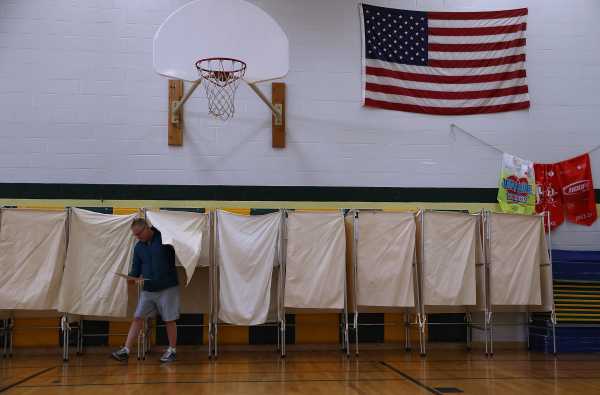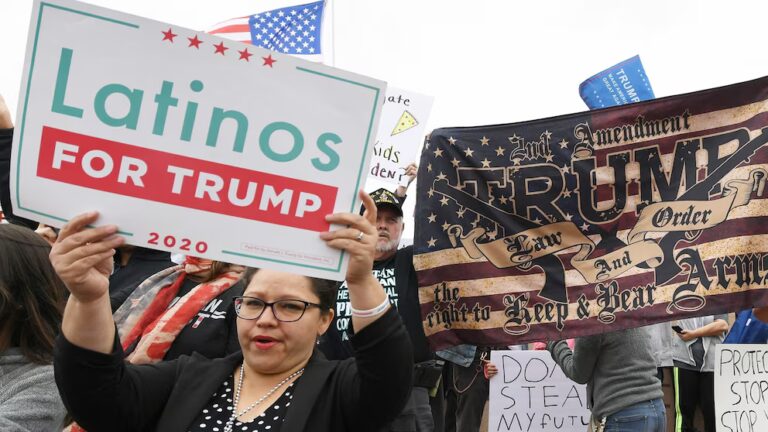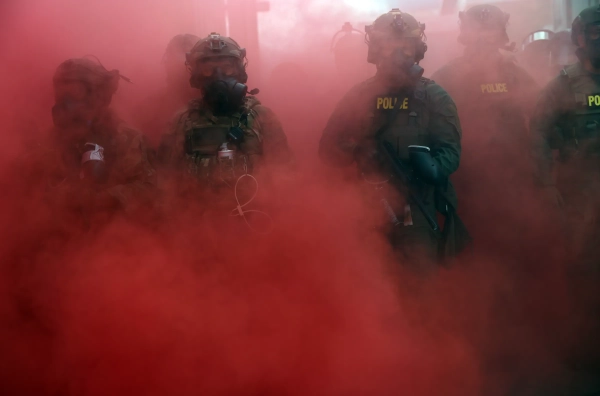
Voters appear to agree with President Donald Trump that the economy is improving, and while Trump is still unpopular, his approval rating is getting better. But according to a new poll, Americans still prefer a Democratic-controlled Congress over a Republican one, and they would rather vote for a congressional candidate who promises to be a check on the president than one who will vote with him all the time.
The poll, from NBC News and the Wall Street Journal, finds that registered voters are relatively pleased with the state of the US economy under Trump and say part of its status is because of him. Forty-four percent of voters say the economy has improved under Trump’s presidency and give him some credit for it; 27 percent say the economy has gotten better but it doesn’t have anything to do with Trump; 25 percent say the economy is the same.
More broadly, 63 percent of voters say they are satisfied with the state of the economy, compared to 37 percent who are dissatisfied. That’s similar to the same poll in January when 69 percent of voters said they were happy with the economy and 30 percent said they were not. (For reference, in the poll’s recent history, the most excited Americans were about the economy was in September 1998, with 86 percent of voters saying they were satisfied with the economy.)
The president’s approval rating is on the rise as well: 44 percent of voters approve of the job he’s doing as president, while 53 percent disapprove. That’s among his best marks since taking office in January 2017.
Americans prefer that Democrats control Congress
Half of the respondents to the NBC News/Wall Street Journal poll said they would prefer a Democratic-controlled Congress, compared to 40 percent who want the GOP to stay in charge. Voters wanting Democrats in charge of the legislature over Republicans has been a consistent trend over the past two years, but the margin seems to be growing: In April 2016, 47 percent of voters said they wanted Democrats in charge and 45 percent said Republicans. That, of course, is not how the election shook out — Republicans are in control of both the House of Representatives and the Senate.
The poll also gave those betting on the “blue wave” something to be optimistic about, as 63 percent of Democrats say they’re very interested in the 2018 midterms compared to 47 percent of Republicans. As the Wall Street Journal notes, the last time Democrats were this enthusiastic about voting was in 2006, when the party picked up 31 House seats and six Senate seats.
Forty-eight percent of voters say they’re likelier to support a congressional candidate who will be a check on Trump, compared to 23 percent who say they’re less likely. And 53 percent say they are less likely to vote for a candidate who supports Trump on most issues, while 31 percent say that would be a plus.
Some of the major issues Republicans hope to run on aren’t winners. Forty-nine percent of voters say they are less likely to pick a candidate who supports Trump’s policies on immigration and border security (39 percent say they’re more likely to back them), and 42 percent say a candidate’s support for the GOP tax plan makes them less likely to vote for them (36 percent say that’s a plus).
There are also worrying signs for Democrats, though. Supporting House Minority Leader Nancy Pelosi (D-CA) appears to be a drag on candidates. And voters don’t seem to know what to do with the Russia investigation or special counsel Robert Mueller’s ongoing probe.
About the same amount of voters say they believe, don’t believe, or don’t know whether the Trump campaign colluded with Russia in 2016. Forty-six percent think the Mueller investigation should continue, while 36 percent think it should end. And 53 percent say they have confidence in Mueller’s impartiality, compared to 40 percent who don’t.
The 2018 midterms are still five months away, and there’s a lot of runway between now and then
Thursday’s poll has bright spots and points of concern for both parties.
For Republicans, a strong economy and a president who is becoming, at the very least, less unpopular doesn’t appear to be speaking to voters in the way they had hoped. The same goes for their tax cuts, which, it turns out, are a hard sell.
For Democrats, the enthusiasm of late last year does seem to be waning, and the electoral map is complicated. Vox’s Li Zhou recently spoke to multiple experts about what they make of Democrats’ chances in 2018. The response: The scenario isn’t terrible, but it’s not great either.
“The blue wave may not be crashing, but its seeming inevitable ascendancy has certainly flattened out,” Tim Malloy, an assistant director of the Quinnipiac University poll, told Zhou. “Our surveys show the president’s numbers rising, gradually building on a surging economy.”
Thursday’s NBC News/Wall Street Journal poll shows it’s not clear how that will all play out.
Sourse: vox.com






